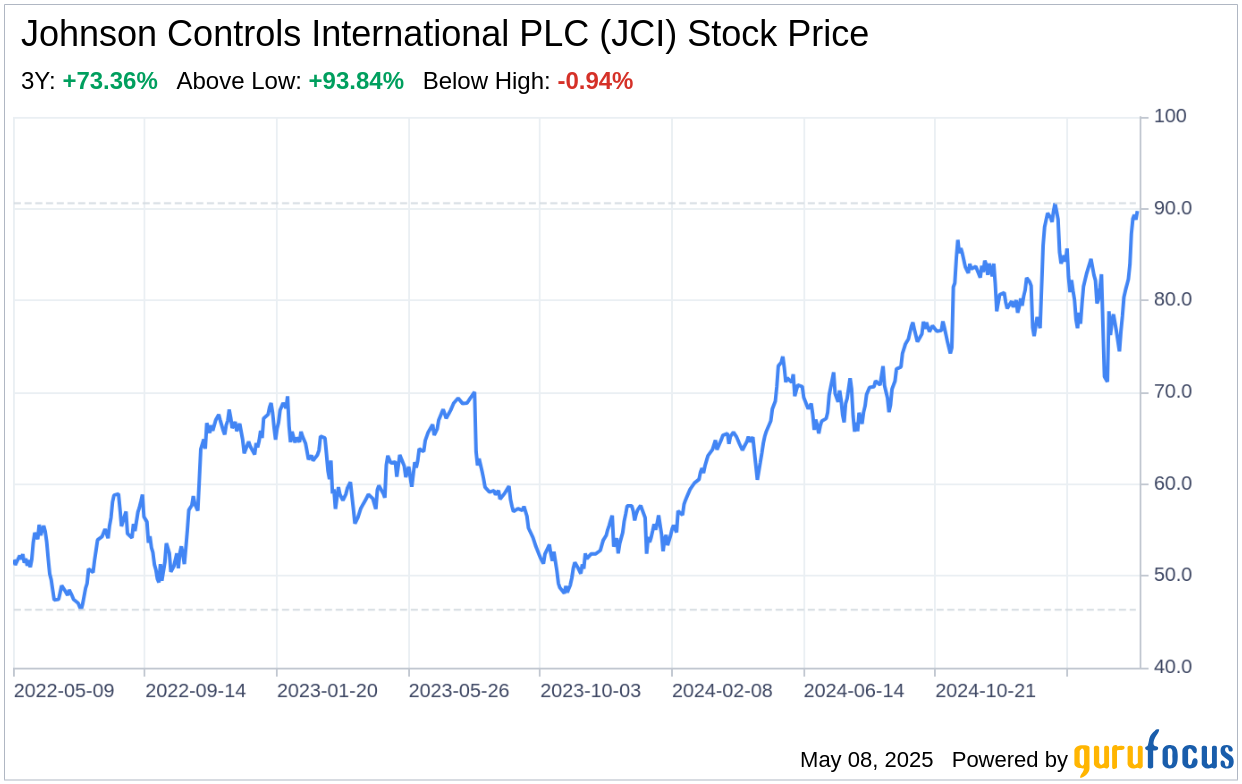On May 7, 2025, Johnson Controls International PLC (JCI, Financial) filed its 10-Q report, revealing a comprehensive overview of its financial and operational performance. As a global leader in smart, safe, healthy, and sustainable buildings, JCI's recent financials show a marked improvement in net income, rising from a loss of $234 million in Q1 2024 to a gain of $526 million in Q1 2025. This turnaround is a testament to the company's resilience and strategic initiatives. The divestiture of its Residential and Light Commercial HVAC business is a pivotal move, allowing JCI to streamline its focus on commercial building solutions. With nearly $23 billion in pro forma revenue in fiscal 2024, JCI's financial health appears robust, setting the stage for a detailed SWOT analysis to inform investors and stakeholders of the company's competitive position and future outlook.

Strengths
Financial Resilience and Growth: Johnson Controls International PLC has demonstrated significant financial resilience and growth, as evidenced by its latest 10-Q filing. The company's net income surged to $526 million in the three months ended March 31, 2025, compared to a loss in the same period the previous year. This remarkable turnaround reflects the company's effective cost management and strategic focus on high-margin commercial HVAC and fire and security solutions, which each contribute approximately 45% of sales. JCI's ability to generate a substantial gross profit of $2,069 million, up from $1,922 million year-over-year, indicates a strong command over its operational efficiency and pricing strategies.
Strategic Divestitures and Focus: JCI's strategic decision to divest its Residential and Light Commercial HVAC business aligns with its long-term vision to become a pure-play provider of commercial building solutions. This move, which involves selling the business to Bosch Group for approximately $8.1 billion, not only provides a significant influx of cash but also allows the company to concentrate resources on its core competencies. By focusing on commercial HVAC, building management, fire and security solutions, and industrial refrigeration units, JCI is poised to further solidify its market leadership and drive innovation in smart building technologies.
Weaknesses
Dependence on Economic Cycles: Despite its strong financial performance, Johnson Controls International PLC's business is inherently tied to the economic cycles of the construction and real estate markets. The demand for the company's products and services is heavily influenced by general economic conditions, credit availability, and public funding. Any downturn in these areas could adversely affect JCI's financial condition and cash flows, as seen in the past with fluctuations in net income and sales. This cyclical nature of the industry necessitates a robust risk management strategy to mitigate potential downturns.
Geopolitical and Supply Chain Risks: JCI faces geopolitical and supply chain risks that could impact its cost structure and operational efficiency. The company's global presence means it is subject to trade restrictions, tariffs, and material cost inflation, which can affect its margins and profitability. While JCI has taken steps to mitigate these risks, including diversifying its supplier network and localizing its supply chain, these measures may not fully offset the impact of such external factors, leaving the company vulnerable to sudden shifts in the global economic landscape.
Opportunities
Growing Demand for Smart Building Solutions: Johnson Controls International PLC is well-positioned to capitalize on the increasing global demand for smart, sustainable building solutions. With a strategic focus on energy efficiency, security, and healthy environments, JCI's OpenBlue digital software platform and comprehensive product portfolio align with the market's shift towards intelligent building management. Government incentives and regulations aimed at reducing emissions and combating climate change further bolster the demand for JCI's offerings, presenting significant growth opportunities.
Expansion in Emerging Markets: JCI has the opportunity to expand its footprint in emerging markets, where urbanization and industrialization are driving the need for advanced building solutions. By leveraging its global brand and technological expertise, JCI can tap into these high-growth regions, offering tailored solutions that address local market needs. Strategic partnerships and acquisitions in these markets could further enhance JCI's market share and revenue streams.
Threats
Intense Competition: Johnson Controls International PLC operates in a highly competitive industry, where rapid technological advancements and innovation are crucial. Competitors may introduce new products or services that could erode JCI's market share or pressure the company to reduce prices. To maintain its competitive edge, JCI must continuously invest in research and development, which could strain its financial resources and affect profitability.
Regulatory and Compliance Risks: JCI is subject to a complex web of regulations across the various markets it serves. Changes in environmental laws, building codes, and safety standards could necessitate significant investments to ensure compliance. Additionally, any failure to comply with these regulations could result in fines, legal liabilities, and reputational damage, posing a threat to JCI's operational and financial performance.
In conclusion, Johnson Controls International PLC exhibits a strong financial foundation and strategic focus that positions it well for future growth. The company's emphasis on smart building solutions and sustainability aligns with global trends, offering significant opportunities for expansion. However, JCI must navigate the challenges of economic cyclicality, geopolitical risks, and intense competition to maintain its market leadership. By leveraging
This article, generated by GuruFocus, is designed to provide general insights and is not tailored financial advice. Our commentary is rooted in historical data and analyst projections, utilizing an impartial methodology, and is not intended to serve as specific investment guidance. It does not formulate a recommendation to purchase or divest any stock and does not consider individual investment objectives or financial circumstances. Our objective is to deliver long-term, fundamental data-driven analysis. Be aware that our analysis might not incorporate the most recent, price-sensitive company announcements or qualitative information. GuruFocus holds no position in the stocks mentioned herein.
